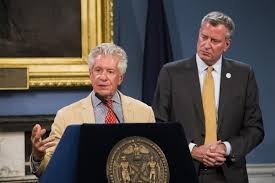
Today Emery laid out his agenda in the Daily News:
Clarifying what is acceptable police behavior is the core challenge for effective civilian oversight..What is clear is that we do not want officers to inflict their frustrations, rage, personal biases or insecurities on civilians. Professionalism means, at least, courtesy and respect, as well as restraint and following training protocols when most people would panic.
That is the job, and it is a hard one. It also demands pride and integrity — so that when inevitable mistakes occur, officers have the courage and support to tell the truth.Many of New York’s Finest have these qualities and act with heroism, restraint and integrity on a daily basis. Some do not. Regrettably, for the past 20 years, the CCRB has not lived up to its promise of requiring professionalism among all members of the NYPD.
It has not gained the respect or trust of the public, who view it as ineffective, or of police officers, who view the CCRB as a kangaroo court.
To turn the CCRB around, I pledge as the newly appointed chair to pursue the following reforms:
Open meetings will be held in evening sessions at locations throughout the five boroughs so that the public can participate.
Information about cases will be posted online so that officers and complainants will be able to track their cases.
Reports analyzing patterns of complaints and special misconduct issues will be made public and provided to the NYPD as early warnings.
Maps showing in real time the frequency and categories of complaints will be posted — so anyone can observe complaint patterns as they occur.
Each case in which misconduct is substantiated will be explained in writing, and significant cases where an officer is exonerated will also have written decisions.
We will have offices and evening hours in each borough.
CCRB vans will go to locations where complaints are frequent.
A mobile phone app will allow filing of complaints and transfers of videos.
We will prioritize important cases so that those with clear evidence and major cases are resolved quickly. These priorities will reflect complaint patterns that focus on specific commands, officers, conditions and types of serious misconduct.
New intake procedures will schedule mediation for virtually all cases at the time a complaint is received.
The CCRB will not only point the finger at misconduct. We will also recognize exemplary police conduct exhibiting integrity or heroism.
Penalties and due process for officers in misconduct cases will be coordinated between the NYPD and CCRB so that police discipline is rational and evenhanded.
We cannot guarantee that, if the new CCRB is successful in our reengineering process, that there will be courtesy, professionalism and respect in every police encounter.
But we can give the public and police a new respect for the police disciplinary process that is a prerequisite to every civilized law enforcement function.
Ultimately, selection and training of officers, meaningful supervision, and a new police culture that eliminates the “us” versus “them” plague that infects both cops and heavily policed neighborhoods are the only way out of our current policing dilemma.
The NYPD’s commitment to community policing and the quest to advance the simple value of bringing the communities of the city and the police closer together is what will change the current climate of distrust. The CCRB can be an effective agent for this change.
Emery is chair of the Civilian Complaint Review Board.